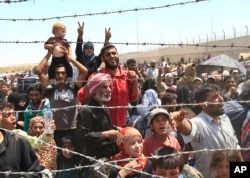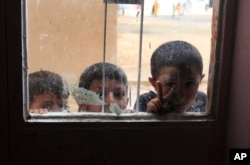The United States says it is working with United Nations agencies to increase humanitarian assistance to Syrian refugees, including bridging the education gap for refugee children fleeing Syria, while experts say immense challenges still remain.
Secretary of State John Kerry last week pledged an additional $24-million contribution from the U.S. to the U.N. High Commissioner for Refugees, to be used to assist refugees and migrants in Europe who now face the onset of winter.
“The United States … is perhaps the largest donor to date to the refugee relocation issue, having put in more than $4.5 billion in humanitarian assistance since the start of the Syrian civil war,” Kerry said last week.
The U.S. has provided Turkey with $325 million — through U.N. agencies and non-government organizations — to support the operation of schools and provide shelters, as well as medical centers.
UNICEF outreach
Meanwhile, UNICEF had announced a plan to reach millions of Syrian children with winter supplies and cash assistance, which is in addition to ongoing programs in health and education.
Government and non-governmental organizations estimate that two-thirds of Syrian refugee children in Turkey are not going to school. A senior Turkish official said that out of 650,000 school-aged Syrian children in Turkey, only 250,000 are getting an education.
“That is [an] enormous number, this number is more than [the numbers in] many countries hosting the refugees around the world...now we are talking about 400,000 children [that] need formal education,” said Ali Osman Ozturk, who attended a meeting in Washington last month. Ozturk is an adviser to the Turkish government.
A senior State Department official, who did not wish to be identified, told VOA that sending those children to school would be like increasing the capacity of New York’s public school system, the largest in the U.S., by 50 percent.
"Imagine what it would mean for America’s future if the entire public school systems of our largest cities – New York, Chicago, Los Angeles – were suddenly to close and stay closed,” Kerry said recently.
Literacy rates
Syria once had one of the world’s highest literacy rates. That was before the civil conflict and refugee crisis. A recent Human Rights Watch report also estimated more than 400,000 Syrian refugee children in Turkey do not attend school. The report stated that children who are not in school could end up exploited and working in hazardous jobs.
Securing an education for these children would reduce the risks of military recruitment by armed groups, increase their earning potential, and better equip the young generation to confront uncertainties, said Human Rights Watch.
Refugee children may obtain an education through Turkey’s national school system or temporary education centers in camps and urban areas. The latter provide Arabic instruction with a modified version of Syrian curriculum, but differences there and Syrian children’s lack of language skills remain a barrier to education, said an advocacy group, the Regional Refugee and Resilience Plan in Turkey, in its 2015-2016 report.
Jihane Nami is refugee program manager with aid group Mercy Corps in Turkey. She told VOA in an email the Syrian population in Turkey is highly mobile. She said with frequent moves to different cities, it’s nearly impossible for a child to have access to continuous schooling.
The U.S. partners with the United Nations Children’s Fund [UNICEF] and other non-governmental organizations, operating 13 stand alone schools in provinces including Kilis, Mersin, Adiyaman, Batman, Osmaniyeh, Mardin, Malatya, Sanliurfa, Gaziantep, and Adana, which accommodate more than 26,000 students. Other funding includes paying school faculty and providing supplies to Turkish schools that grant access to Syrian refugees.
“Today, we only have one third of the Syrian school-aged children in schools. The risk there is nothing less than losing an entire generation of Syrian children,” said Philippe Duamelle, a representative from UNICEF who frequently visits various camps and schools for refugee children in Turkey.
Essential needs
In Turkey’s 25 government-run refugee camps, about 90 percent of school-aged Syrian children regularly attend school, but the majority of children outside the camps do not, according to the Human Rights Watch report.
Duamelle told VOA the goal is to double attendance by June of next year. He added that UNICEF is working to build more schools, arrange basic transportation, offer child protection and psychosocial service, provide vocational training to equip young adults to enter into the job market, and issue monthly cash incentive cards to about 8,000 Syrian volunteer teachers.
Providing education as well as jobs for Syrians in Turkey are among the major things that will make Syrians feel more at home, even though it is a temporary home for a long period of time, said a senior official from the State Department’s Bureau of Population, Refugees, and Migration.
“Refugees want to go home. They don't want to be refugees,” said Suzanne Meriden from the Syrian American Council in a recent interview with VOA.
“We are very keen on this issue because we know that in post-conflict era, new Syrians will be [run] by those generations,” said Ali Osman Ozturk, the Turkish government adviser, because Syrian children’s attendance in Turkish high education is critical for Ankara.













